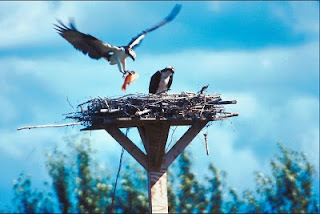Often mistaken for an immature Bald Eagle, Osprey is the only raptor with a reversible outer toe. However, this “Fish Hawk” is neither a Hawk nor a Falcon, but instead is classified in her own family of Pandianidae. With her special toe, Osprey is perfectly adapted to capturing and securing her elusive prey-Fish.
As a fish eater, Osprey has one of the widest ranges for Birds, and can be found worldwide. Her opposable toe gives Her wide latitude also. For example, when Osprey is perching on a tree, her three toes remain in front while the fourth one grips the branch from the back. In catching a Fish, her toes line up with two on either side of her prey. Flying low over the lake, Osprey grabs her prey with her feet. Moreover, the spiny soles on her feet help Her to keep a firm grip on the slippery Fish. However if Osprey grabs a particularly large Fish, She stands a chance of drowning since She cannot let go easily.
People around the world respect Osprey and her mythic powers. The Pueblo People of North America named Her, “Water Eagle". Meanwhile other Native Americans regarded Osprey to have good powers since She often warned people of impending danger.
In Europe, Osprey was the “White Eagle” of heraldry, for She caught Fish through hypnosis. Instead of escaping, They would simply turn belly up in surrender. Because of this myth, people believed that killing an Osprey would cause the Mackerel and Herring to leave the nearby seas.
Anywhere Fish live, there you will find Osprey. With her special toe, She is highly adaptable. Wherever She dwells, Osprey employs her consummate skill at fishing. So good is Osprey that She is considered an honorary Eagle.
Osprey shows how having a skill allows you to adapt to life most anywhere. With a skill, you can thrive in any place of your choosing. Just do not become so overconfident that you grab a Fish large enough to drown you. “Choose wisely,” counsels Osprey.
-----------------------------
Copyright: Virginia Carper (2010), Animal Teachers, animalteachers @ gmail . com

No comments:
Post a Comment